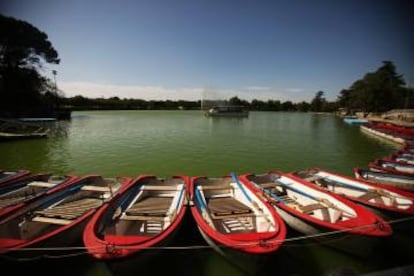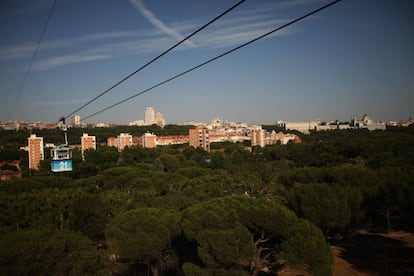Madrid’s Casa De Campo: Central Park on steroids
Less visited by tourists than other attractions, the huge site boasts a pool, a zoo and an amusement park
While thousands of tourists brave Madrid’s scorching summer heat to see sights such as the Plaza de España or the Royal Palace, Mateo López is spending hours observing both spots without having to move from his folding chair. He is doing so from afar, under the shade, while peacefully fishing at a lake. Mateo is one of the thousands of Madrileños who make regular visits to the Casa de Campo, the city’s largest park. At 1,723 hectares, it is roughly five times the size of New York’s Central Park.

A gentle breeze in the park blows against Caroline’s dress. A native of France, she was given numerous recommendations to make a visit to the site, which has been granted cultural heritage protection (BIC) by the Spanish authorities. “I’ve spent many days here, and I always discover something new,” she explains. Today she is planning to eat at one of the restaurants surrounding the lake.
Between May and September, Madrid is an oven. People come here to cool down
“Between May and September, Madrid is an oven. People come here to cool down,” says Claudio Poppel, who runs a business at the park.
“I speak five languages, and I work in a kiosk,” complains Isabel Paños, while serving a young customer. But her mastery of so many languages helps her these days. “In the summer, a lot of foreigners come, but in the winter, there are only cyclists,” she explains.
While canoeists train on the lake, Isabel and Patricia are heading off for a dip at Casa de Campo’s public pool. “The facilities are great, and it’s very peaceful here,” they say. The park is also a popular meeting place: couples go on dates there and teenagers use it for their afternoon place of leisure.

It is also a place that brings different generations of Madrileños together, as it is a customary for families to spend quality time there. “We’ve been coming here all our lives,” says Pilar, who is aided by a walker and in the company of her son Mariano and her granddaughter Lucía. Others, like Alfonso Fernández, seize the opportunity to run through the open space because “there is no moving traffic” – cars have been prohibited from entering since 2007.
Rubén is among those who think that Casa de Campo is undervalued. “It’s the biggest park in the world, much bigger than Central Park, which appears all the time in movies.” The grounds also contain the IFEMA convention center, the multipurpose Madrid Arena venue, a zoo and the place that perhaps dazzles Ruben’s children the most: the Parque de Atracciones amusement park.
In the summer, many foreigners come, but in the winter there are only cyclists
The public park emerged from a Renaissance-era house: Casa de Vargas. However, the real story began with the decision of King Philip II to move the royal court there, bringing his permanent residence and taking over more and more land around it to use for hunting. Under Fernando VI, the site was named the Royal Forest (Bosque Real in Spanish), while Carlos III brought agriculture and cattle. With the arrival of the Second Spanish Republic, the government ceded ownership of the property to Madrid City Hall in a massively attended celebration on May 1, 1931.
Among the abundant plant life, the predominant species is the umbrella pine tree. Like other parks in the city, there is a variety of animals: migrating birds, owls, parrots, snakes and rabbits. “The great environmental value is found in the seasonal course of the streams,” says Juan García of Ecologists in Action. In the most recent census of species, conducted in 1972, 133 different types of vertebrates were found.

“We all know the park’s ecological value. Now we want to give it a new role as a historical enclave,” explains Luis de Vicente, a member of the Salvemos la Casa Campo (Save Casa de Campo) campaign. De Vicente claims that there are several hidden treasures in the park, whose features have not been altered over the centuries, as one can observe in the photos that José Corral took in 1932, commissioned by City Hall. Then the Spanish Civil War came, which turned the park into a battlefield and saw many of its constructions destroyed. Among them, 17 of the historic gates and a church designed by Italian architect Francesco Sabatini. “Its ruins remain here, only covered by ground. At some point, they will have to resurface,” says De Vicente.
Casa de Campo: Fast Facts
Size: 1,723 hectares
Ownership: Madrid City Hall
Predominant tree species: Umbrella pine (66%), evergreen oak (14%) and Arizona cypress (3%)
Sports facilities: The majority are situated around the lake, such as the tennis courts. There are jogging and biking paths and a public pool. In 1991, a business opened to provide canoeing instruction.
Structures: The Parque de Atracciones theme park, Madrid Arena sports venue, the zoo, the 2.5-kilometer ferry and the 67-hectare grounds.
How to get there: By Metro, Line 10 (stop at Lago, Batán or Casa de Campo) and Line 5 (Casa de Campo). By car, you cannot get further than Avenida de Portugal. To access Casa de Campo, park at the lot next to the Zoo and the Parque de Atractiones.
English version by Henry Hahn.
Tu suscripción se está usando en otro dispositivo
¿Quieres añadir otro usuario a tu suscripción?
Si continúas leyendo en este dispositivo, no se podrá leer en el otro.
FlechaTu suscripción se está usando en otro dispositivo y solo puedes acceder a EL PAÍS desde un dispositivo a la vez.
Si quieres compartir tu cuenta, cambia tu suscripción a la modalidad Premium, así podrás añadir otro usuario. Cada uno accederá con su propia cuenta de email, lo que os permitirá personalizar vuestra experiencia en EL PAÍS.
¿Tienes una suscripción de empresa? Accede aquí para contratar más cuentas.
En el caso de no saber quién está usando tu cuenta, te recomendamos cambiar tu contraseña aquí.
Si decides continuar compartiendo tu cuenta, este mensaje se mostrará en tu dispositivo y en el de la otra persona que está usando tu cuenta de forma indefinida, afectando a tu experiencia de lectura. Puedes consultar aquí los términos y condiciones de la suscripción digital.








































